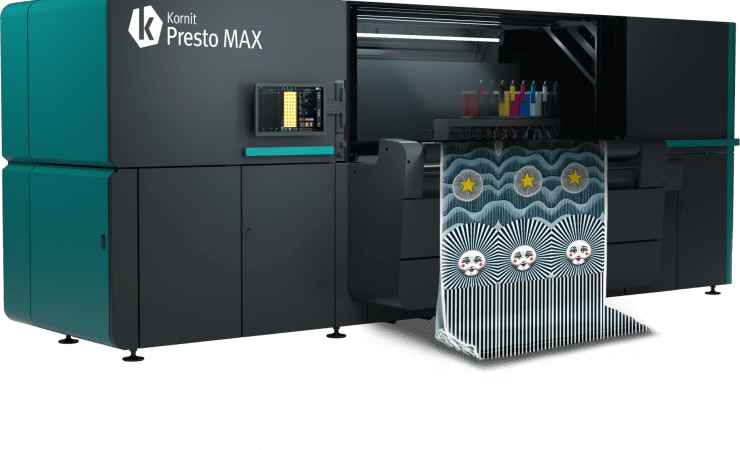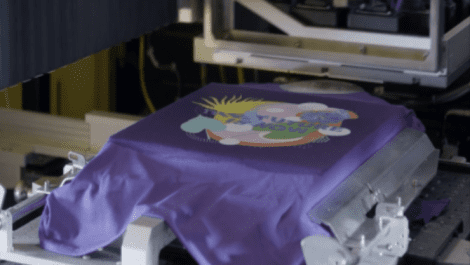Kornit Digital used ITMA as the platform to introduce various additions and enhancements to its garment and fabric printing range, including the first public showing of an almost fully-automated DtG printer capable of 400 finished garments per hour, in addition to further improved versions of existing lines.
Introduced at Kornit’s Tel Aviv fashion week in spring 2022, the new Apollo DtG platform shown in operation at ITMA is built on Kornit’s Max technology and is described by Kornit as ‘the most comprehensive, streamlined single-step solution for nearshore short- and medium-run apparel decoration’. It was designed to decorate 400 unique garments per hour, using automated loading and unloading, integrated smart curing, and inline garment type adjustment in order to yield higher output and reduced labour, needing only one person to run and load the integrated print and curing system. Speaking at the press launch, chief product officer Danny Gazit stated that ‘no one else is close [to this speed], it’s faster than some analogue systems and has automated unloading’.
‘The fashion and textile industry has remained at a crossroads – aware of its limitations but lacking a clear solution for moving from wasteful, inefficient production models,’ added Ronen Samuel, chief executive officer at Kornit. ‘Offering a true platform for agile, high-throughput digital production on demand, Apollo transforms what apparel producers and brands can do. It empowers them to meet the creative inspirations and ever-changing demands of a global community with capabilities to fulfil those expectations, with quality, consistency, sustainability and the necessary profitability to scale no, matter what unforeseen trends await.’
Upgraded products on show at ITMA included the new Atlas Max Plus system, which takes Kornit’s existing Atlas Max platform to 150 garments per hour, a 20% speed increase. With integrated Smart Curing, Rapid Size Shifter pallets and autonomous calibration, the system ‘takes smart production capabilities a step forward introducing production flexibility, consistency, and the highest quality available’. Kornit’s QualiSet software allows for autonomous calibration of each device to provide matching output over time and across multiple machines or sites; Smart Curing adjusts on the fly for each garment according to type and print coverage, resulting in minimised energy use and total cost of ownership.
Also on display at ITMA is the recently introduced Kornit Atlas Max Poly, said to be ‘the most efficient speciality system for polyester decoration, covering also polyester blends, tri-blends, and other synthetic fabric combinations’. The system delivers colourful and vibrant prints using neon inks while meeting retail-grade expectations for quality and durability. It also offers a vinyl emulation capability.
Kornit also introduced Vivido ink, which it says achieves darker, deeper blacks and colours and establishes ‘new fashion standards’ with a pigment-based process in the Presto Max printer, with lower ink usage and better hand-feel. On the software side, it also presented the Kornit X global production network that links service providers to customers, part of the company’s ‘ecosystem’.



